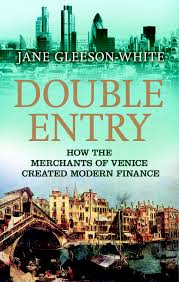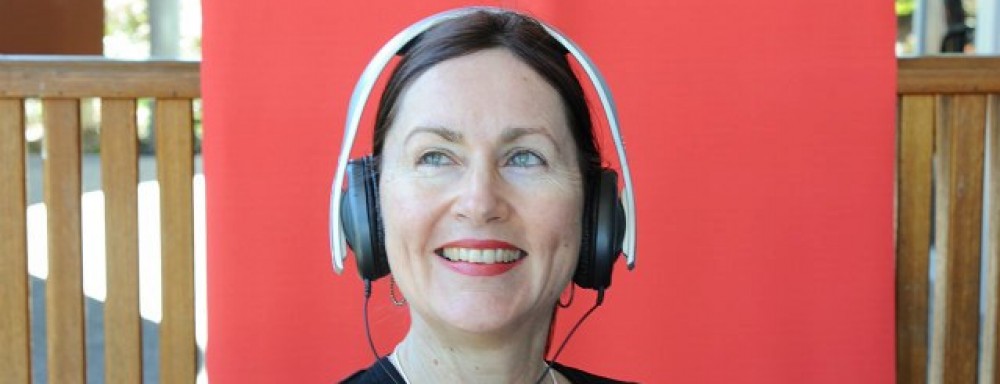The subtitle of this book is ‘How the Merchants of Venice created modern Finance.’
Yep, this is a book about the thrills, chills, and spills of accounting and accountants, the thrills of receipts, chills of ledgers, spills of debits, and that is just the beginning! Economics is the dismal science, and accounting is its dreary cousin.

In 1986, according to my notes, I read Fernand Braudel’s ‘Capitalism and Material Life, 1400–1800’ in three magisterial (a code word for large and long) volumes. Braudel asserted in passing that the invention of double entry bookkeeping generated capitalism in Europe, first in Italy and then as Italian banks expanded northward to Amsterdam in Europe as a whole. At the time, I asked an accountant upstairs what double entry bookkeeping was, and he invited me to attend his twenty-seven lectures in Accounting 101 to find out. Some people always want to start way back at the beginning.
I tried again a few years later when I asked another accountant, who answered, in exactly 50 minutes, a lecture. That was simultaneously TMI + NEI or Too Much Information and Not Enough Information. None the wiser, my interest withered. But the ground was covered, as lecturers like to say.
Then one day I came across this title. The blurb promised that it would reveal all about double entry bookkeeping is. I took the bait! Who wouldn’t? Here is what I learned.
The Crusades created first mass tourism through Northern Italy which bought vastly increased demand for goods and services. Enterprises flourished to take advantage of the market opportunities these tourists offered, and so Italy has since remained. The Crusaders, those that came back, brought many things with them apart from saintly shin bones that they acquired from enterprising Arabs, they also brought back Arabic numbers.
Venice made sure it got a piece of the tourism action both ways, and the tourist boom it got put it on the map to stay since then.
Mathematics evolved thanks to those Arabic numbers, though it was resisted by the Catholic Church which saw evil in Arabic numbers. Multiplying and dividing was regarded as black magic. Sounds like an analysis by Fox News today. Ignorant and proud of it!
Though very Catholic, the authorities in Venice were pragmatic enough to tolerate Arabic numbers, despite papal fulminations. (Presumably some gold changed hands to buy the silence of the local prelates.) Indeed, Venetian authorities encouraged sound book-keeping, the more prosperous businesses are, the more taxes are due; the more accurate records are kept, the easier it is identify the taxes that are due and collect them. On this reasoning, the Venetians also invested in education! Hmm, has not quite caught on that one. Smarter, more well informed people make better use of their resources and opportunities to solve problems. This is still a new idea to some governments today, it seems.
Moreover, the Venetians licensed the publication of books about mathematics that spread the word through the Mediterranean world. Indeed because of its relative tolerance and stability it became a centre for book publishing as Amsterdam was to become later. Some of the earliest mathematics books published in Venice were applied mathematics aimed at book-keeping, says our author.
After all that background, what is double entry book-keeping? Good question, Mortimer! The essence is that each transaction is recorded in two entries, one called ‘credit’ and the other ‘debit.’ Wake up! ‘Credit’ and ‘debit’ are not used here in their ordinary meanings. (Those conscripted to use Spendvision will realise that there is nothing intuitive about accounts.)
Prior to double-entry book-keeping (hereinafter, DEBK) merchants, nobles, tradesmen, households did not keep accounts of any kind. I expect most of us still run the business of our daily lives like this.
Those that did keep records before DEBK, made notes on scraps of papers as reminders when something had to be followed up.
Most of us do a little book-keeping, say when keeping receipts for business expenses to submit for reimbursement from the firm, or to support business deductions on income tax. Either when submitted or at the end of the tax year we categorise and total these records. That is a primitive form of book-keeping. Corporate credit cards perform some of this record keeping for business expenses.
Before DEBK, the more careful merchants, especially those with larger volumes of transactions, began to write them down in a single list, e.g., of things bought and things sold. A month later it would be hard to find a particular transaction in that list, undifferentiated and without annotation. First came annotations which took the name ‘memorandum.’ These memos were sorted and entered again in a journal (a term still used in accounting), and finally in a ledger.
DEBK nests in a ledger with a T making two columns that are still to be seem in ledger books at Officeworks, Staples, or OfficeMax.
If I have $500 in my pocket then I have a debit against my capital of $500 and a credit in cash of $500, ergo two entries.
I know there is a lot more to it, but like all those accounting students I find it hard going.
The book goes on to claim that DEBK is the key to the whole of capitalism because someone said so. A lot of someone’s are cited, but…. Hold on! Slow down! Wait a minute!
The author shows that many people talked about and praised DEBK from, say, 1500 on, but not once, not ever does the author show that it improved business practice, was associated with greater productivity, led to more revenue for Venetian purses or anyone else’s. In short, there is nary a (factual) word about impact. It is all very Cultural Studies (a phrase I always shudder to hear, let alone type) to suppose that talk is reality and that reality is but talk. (Didn’t those Cultural Studiest ever mean a Lying Blackfoot? [You either get it or you don’t.]) Everyone praises Christianity, but it is seldom practiced with the fervour with which it is praised, even by those who praise it most, i.e., members of the Tea Party.
To a jaded reader (me) the best chapter then is the penultimate one on accounting scandals. Whew! What a list: Enron, Royal Bank of Scotland, World Com, HIH, One.Tel, ABC Learning, and that is just in the very recent past with an emphasis on some of the small potatoes of Australian examples. Of course when the potatoes are all one has, they are not small. Despite Australia’s sorry experience, it has more accountants per square dollar than either the United States or Kingdom (p. 153).
The author carefully alludes to the string of examples of accounting firms, which trade on their reputations, signing off on accounts of such corporations as those above a few days before the house of cards falls, and much to everyone’s surprise the piggy bank is empty, including the pension fund.
It does make a punter like me wonder what the point of it all is. (Yes, I thought of Foucault.) Have rules become so complex that a clever and determined villain can use them to hide the trail (in some cases for years)? Do more rules create more loop holes, black spots, grey areas, and trees to hide the forrest and just generally make it easier to play hide-and-seek?
For a couple of years I served on an Institute of Charted Accountants committee that enforced professional ethics on its members. The rigour of the proceedings of this committee, the take-no-prisoners attitude of its professional members (I was a lay member) was all very impressive, but all the cases (documented sometimes in hundreds of pages) were about the date of a membership re-newal to the Institute or something else on that level. Was the postage stamp correctly squared on the envelope, is what I silently thought sometimes. (Yes, it was that long ago that postage stamps were relevant.) Such tiny ants were destroyed with titanium tipped warheads! Ouch! Inevitably, the accountants involved were sole practitioners who were humbled before this pitiless tribunal. Meanwhile, the major accounting firms in the same building were signing off on the accounts of the likes as those above. Go figure.
In this world, the mud seldom sticks. The author describes some of the subsequent careers of many of the major players in the scandals above. At a corporate level the accounting firms that approved the accounts of such corporations change their logos and web sites, a few partners take the money and run, oops, retire, and the firms continue to dominate not only the market for accountants but also for consultants to government and more. One fears the same people who brought us the last corporate collapse are now happily advising governments on the next one. No mea culpas can be heard.
Like tools, rules can be used for good or ill to be sure. But independent audits are supposed to deter and detect some of the ill. Maybe they do, but that does not make the headlines.
Tidbits, there are a few. The CEO of the Royal Bank of Scotland CEO presided over the creative accounting that led to its near-death experience got a golden parachute of £16 million paid for by the ever generous British taxpayers (p. 197).
The high and mighty behemoth Arthur Andersen started in 1929 as a cleanskin firm which would ferret out cheats, and died in 2002 of the same poison. Well do I remember once getting told off by a very proud Andersenian about the irrelevance of ethics education in business degrees.
By the by, Enron started in Omaha where it trod the straight and narrow, but when it moved to Texas, well it crossed more than a state line, thus confirming some deeply held prejudices of mine.
 Jane Gleeson-White
Jane Gleeson-White
As to the book, there is too much background and too much repetition and not enough focus or exposition of essence of double-entry to my mind. I still not sure what it is, so don’t ask.
‘Copyright’ (p. 78), no I do not think there was any intellectual property, but rather a license that permitted publication (i.e., passed by the Church censor and the Venetian censor). Copyright protecting the author’s intellectual property is centuries in the future.
A word is used that I cannot find in a dictionary: ie (p. 94). Even the spellchecker thinks it should be i.e. but not in this book.
There is a reference to Aristotle reviling interest on borrowed money but no text is cited (p. 96).
